

This is a guide made especially for caregivers to understand more about what social isolation is, how it affects the elderly, and how they can help the elderly population more effectively. What is social isolation? Definitions of social isolation. The difference between loneliness and isolation. Loneliness & Isolation. Comment - Differences Between Loneliness and Social Isolation. Effects of Social Isolation on Elderly in a Nutshell... Health Effects of Social Isolation and Loneliness – Aging Life Care Association™ Clifford Singer, MD Adjunct Professor, University of Maine Chief, Geriatric Mental Health and Neuropsychiatry Acadia Hospital and Eastern Maine Medical Center 268 Stillwater Avenue Bangor Maine 04402 207.973.6179 csinger@emhs.org Cliff Singer is a geriatrician and psychiatrist.
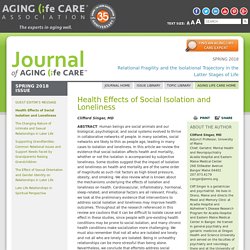
‘Social recession’: how isolation can affect physical and mental health. As the Covid-19 pandemic continues, millions of people in the US are coming to terms with being increasingly cut off from society.
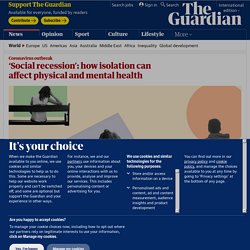
Beyond the inconvenience of working from home, or not being able to go to bars, restaurants or cinemas, however, experts have found that social isolation can have a profound effect on people’s physical, as well as mental health. Long-term, isolation even increases the risk of premature death. Comments - The first two articles. Social Isolation. Comment - Social Isolation Article.
Social Engagement and Cognitive Impairment in Older Chinese Adults: The Mediating Role of Psychological Well-Being. Social Isolation and Memory Decline in Later-life. Skip to Main Content Advertisement Search Close Advanced Search Search Menu Article Navigation Volume 75 Issue 2 February 2020 Article Contents.
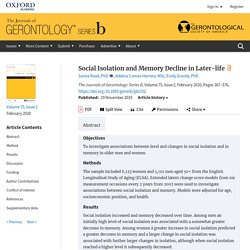
Comments - The Previous Two Articles. A model that shows how social engagement or connections influence increased morbidity and mortality (Holt-Lunstad & Smith, 2016) The loneliness of social isolation can affect your brain and raise dementia risk in older adults. Physical pain is unpleasant, yet it’s vital for survival because it’s a warning that your body is in danger.
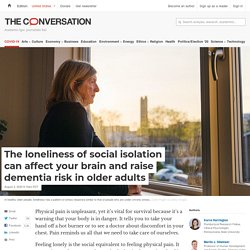
It tells you to take your hand off a hot burner or to see a doctor about discomfort in your chest. Pain reminds us all that we need to take care of ourselves. Feeling lonely is the social equivalent to feeling physical pain. It even triggers the same pathways in the brain that are involved in processing emotional responses to physical pain. Just like feeling physical pain, feeling lonely and disconnected from others is also a signal that we need to take care of ourselves by seeking the safety and comfort of companionship. As scholars at the Center for Healthy Aging at Penn State, we study the impact of stress on the aging body and brain, including how it can worsen cognitive decline and risk for dementia. The health consequences of loneliness The COVID-19 pandemic has put many older adults’ social lives on hold, leaving them at greater risk for loneliness. Explanation/Summary - Holt-Lunstad & Smith (2016)'s Model. What are the causes of isolation? Causes of Social Isolation in Elderly Adults.
No one likes to feel lonely or isolated, but for many seniors, it’s a feeling they know all too well.
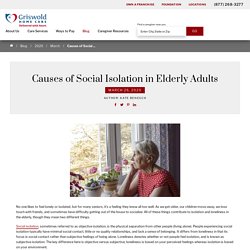
As we get older, our children move away, we lose touch with friends, and sometimes have difficulty getting out of the house to socialize. Summary of Causes. COVID-19 is another cause of social isolation and loneliness. Let's take a look at some examples in Singapore... Social isolation and the elderly poor in Singapore. SINGAPORE: Her one-room flat was a cluttered mess, and Madam Helen Fernandez herself never seemed to bathe, said her neighbours who always saw her in the same set of clothes.
When case workers first visited the unkempt and confused elderly widow, they had to rush her to hospital for very high blood pressure – which resulted because she hadn’t been taking her medication and had been missing doctors’ appointments. Since her husband died 17 years ago, Mdm Fernandez had been living alone with no friends or family – and slowly falling prey to loneliness and dementia. There were times when she’d even call up the police just to talk. It was how her case got referred to the Social Service Office, and then to case worker Ahmala Rajoo in 2015. “She was receiving financial assistance, about S$500 a month,” said Ms Ahmala, a care executive with NTUC Health Cluster Support in Bukit Merah. But the neatly-groomed Mdm Fernandez you meet today almost doesn’t seem the same person. “Her memory has worsened. Coronavirus: Elderly hit hard by social isolation amid circuit breaker measures, Health News.
A needle and the television set - these two objects have been keeping 83-year-old Nellie Woo company from morning to night for the past week while she is holed up alone at home. Seniors felt less socially satisfied, more isolated during Covid-19 circuit breaker period: Survey, Singapore News. SINGAPORE - Social isolation during the circuit breaker period resulted in lower social satisfaction levels for senior citizens, according to results from a monthly survey of about 7,500 people aged between 55 and 75 here. Social satisfaction levels dipped by about 4 per cent in May when compared with data from January. In particular, for senior citizens living with others, satisfaction levels fell to the pre-circuit breaker levels of peers living alone, while those living alone saw even lower satisfaction levels as safe distancing measures made it more difficult to find support from friends and the community.
As of July, while satisfaction levels have rebounded after the circuit breaker period, which was from April 7 to June 1, they are not back to the levels they were at before. As Singapore's population ages, the proportion of those who remain single and live alone will increase, said Prof Straughan, a sociologist and former Nominated Member of Parliament. COVID-19: Ensuring the elderly don't become isolated during the outbreak. SINGAPORE: Organisations that provide care and support for the elderly are stepping up outreach efforts to prevent loneliness and heightened isolation among old folks during tighter safe distancing measures put in place during the COVID-19 pandemic.
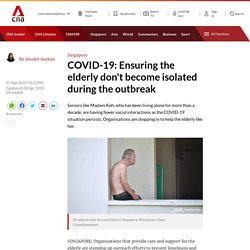
To protect seniors – a vulnerable group at a higher risk of getting a severe infection – activities for them were already suspended earlier in March. With further distancing measures in place, the lack of social interaction and physical activity could have a negative impact on the mental and physical health of vulnerable elderly populations, said Dr Chris Tsoi a senior consultant from the department of psychological medicine at the National University Hospital (NUH).
Madam Koh lives alone and has already seen reduced social interactions over the past few weeks. “No, no I don’t go out. Comment - Summary and Analysis. Let's look at some possible interventions available to mitigate the effects of social isolation on elderly... Ways of Preventing Social Isolation Among Seniors. As seniors age, their lives can become more isolated.
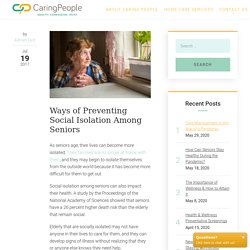
Their families are no longer at home with them, and they may begin to isolate themselves from the outside world because it has become more difficult for them to get out. Social isolation among seniors can also impact their health. A study by the Proceedings of the National Academy of Sciences showed that seniors have a 26 percent higher death risk than the elderly that remain social. Recovery Intervention to Promote Social Connectedness through Social Recreational Programs for Persons with Dementia: A Critical Analysis. 1.
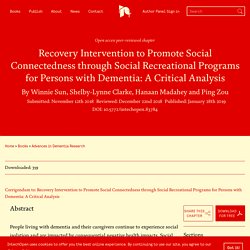
Introduction On a global scale, more and more individuals are living longer, thus increasing the global aging population. It is important to take into consideration that as the population ages, certain health requirements need to be fulfilled in order to meet the needs and specificity of care for older adults outside the traditional medical care model [1]. Such is the case among individuals living with dementia in addition to the family members and loved ones who care for them. It is crucial to be prepared as a society to address the needs of older adults at the community level and provide a more holistic approach to health and wellness.
Now, equipped with the knowledge of how social isolation and loneliness influences the elderly, let's find out how we, as caregivers, can help them :) Coronavirus and COVID-19: Caregiving for the Elderly. Reviewed By: When it comes to COVID-19, the disease caused by the new coronavirus, older people are especially vulnerable to severe illness.

Research is showing that adults 60 and older, especially those with preexisting medical conditions, especially heart disease, lung disease, diabetes or cancer are more likely to have severe — even deadly — coronavirus infection than other age groups. If you’re caring for an older loved one, you might be worried. Alicia Arbaje, M.D., M.P.H., Ph.D. specializes in internal medicine and geriatrics at Johns Hopkins. Ways to Tackle Depression and Social Isolation in the Elderly Using Technology – SilverActivities Blog. February 27, 2019 One in every twenty people in Singapore suffers from depression.
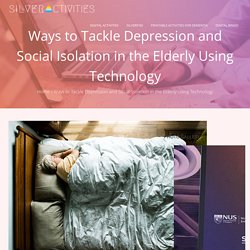
Even though depression is relatively more common among elderly, it is not a part of normal aging. The main causes of depression in old age can be separation from closed ones, loneliness, loss of a friend or family member and health problems. Comment - Role of Caregiver. Managing Caregiver Burnout :) Caregiver Stress and Burnout. What is caregiver burnout? While caring for a loved one can be very rewarding, it also involves many stressors. And since caregiving is often a long-term challenge, the emotional impact can snowball over time. You may face years or even decades of caregiving responsibilities. It can be particularly disheartening if you feel that you’re in over your head, if there’s no hope that your family member will get better, or if, despite your best efforts, their condition is gradually deteriorating.